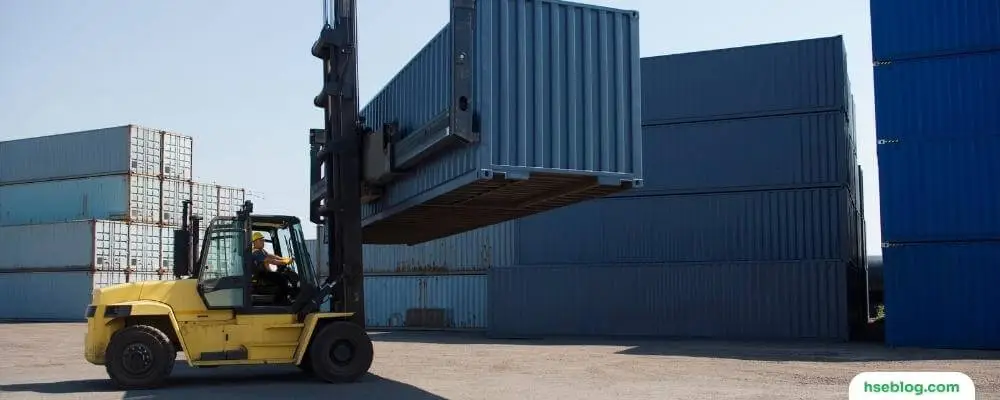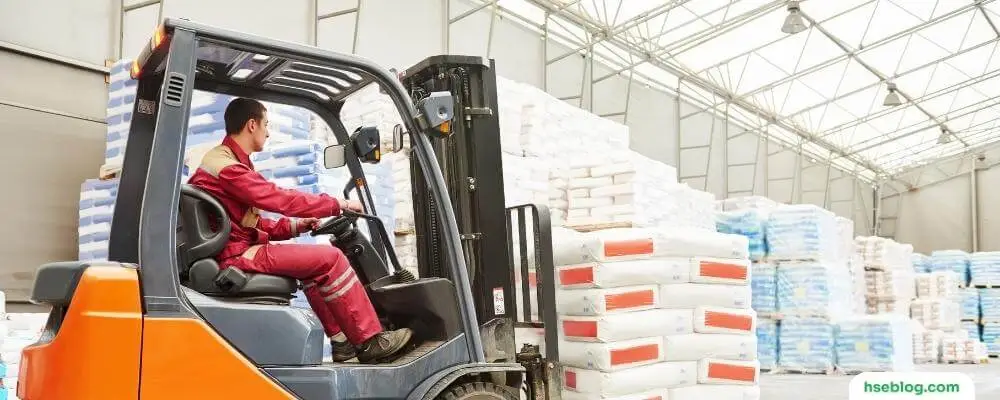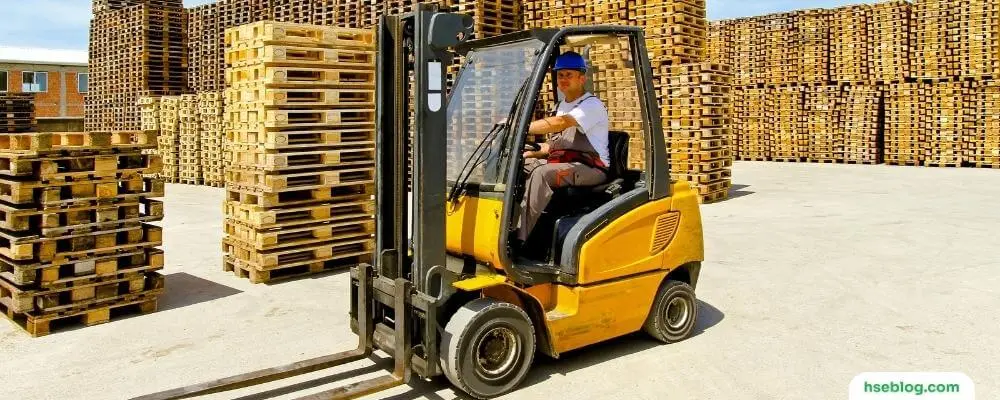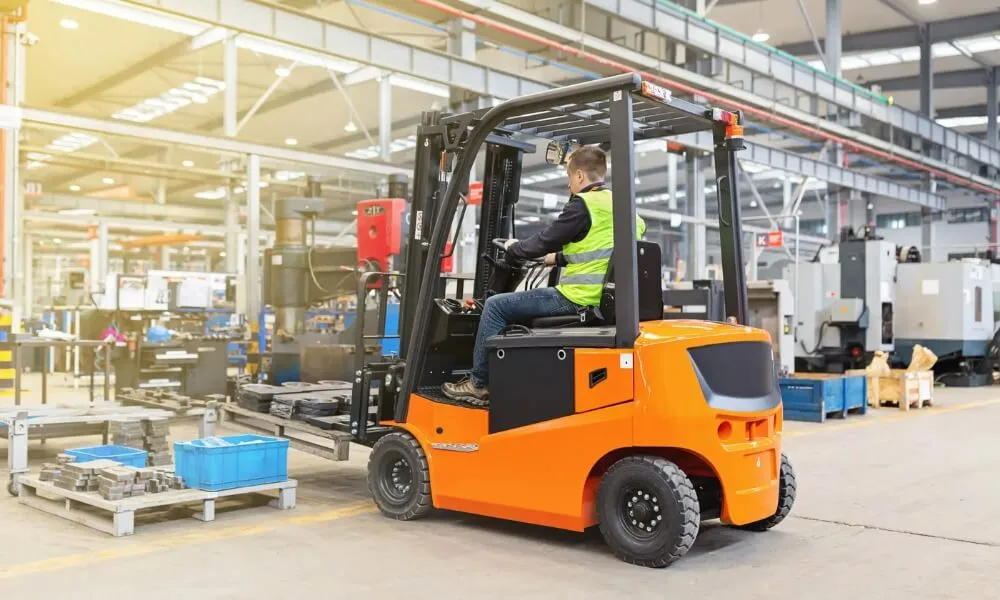The unsung heroes of warehouses and industrial settings, forklift operators are the linchpins that keep operations running smoothly. In this insightful article, we will take you through the demanding and dynamic world of forklift operators. This position is both challenging and rewarding, from the precision required to handle delicate materials to the dexterity needed to maneuver through narrow aisles.
This article is an invaluable resource for aspiring forklift operators who want to know what the job entails and for employers looking to hire and understand the competencies they should be seeking. Additionally, those curious about the behind-the-scenes of warehouse logistics will find this article enlightening. Strap in as we lift the veil on the day-to-day responsibilities, skills, and impact of forklift operators in the fast-paced environment they thrive in.
What Is A Forklift Operator?
A Forklift Operator is a specialized professional responsible for operating forklifts, powerful industrial trucks designed for the lifting, moving, and stacking of materials. These materials can range from pallets loaded with products to large containers, heavy machinery, or construction materials.
Forklifts come in various types and sizes, each tailored to meet specific needs in different work environments. For example, smaller, more maneuverable forklifts may be used in warehouses where operators need to navigate narrow aisles. In contrast, larger, more robust forklifts might be used on construction sites to move heavier loads.
These operators perform crucial roles in various settings, such as warehouses, factories, distribution centers, and construction sites. Their role is pivotal in ensuring the smooth running of these operations as they contribute to the efficient flow of goods from one point to another and the effective organization and storage of goods.

Forklift Operator Job Description | Duties & Responsibilities
A Forklift Operator is a critical component in the efficient functioning of warehouses, factories, and other industrial environments. Their duties encompass a broad range of tasks to ensure the seamless movement and handling of goods. Below is a more detailed overview of the responsibilities of a Forklift Operator:
- Loading and Unloading: The operator is responsible for safely loading goods onto trucks, trailers, or rail cars and unloading incoming shipments. This includes precisely stacking items to maximize space and prevent damage during transit.
- Transporting Materials: Forklift operators drive their vehicles throughout the facility to transport materials to different locations, ensuring they are delivered to the right department or workstation.
- Optimizing Loads: They must strategically arrange and secure loads to maximize efficiency without compromising safety.
- Vehicle Inspection: They regularly check the forklift and other vehicles for any signs of damage or wear that might affect performance.
- Maintenance Scheduling: The operator must schedule regular maintenance and necessary repairs for the forklifts to ensure they remain in good working condition.
- Inventory Management: Through RF scanning equipment, they keep track of inventory levels and ensure the accuracy of stock records.
- Order Processing includes picking items from shelves, wrapping them securely, and preparing them for shipment.
- Safety Compliance: Forklift operators must identify any safety hazards in the workplace and adhere to all safety standards and company policies.
- Production Scheduling Adherence: They must work within the timelines, ensuring that materials are moved efficiently to keep up with production schedules.
- Hazardous Material Handling: In cases where they are required to move hazardous materials, they must do so in compliance with regulations and safety procedures.
- Workspace Cleanliness: Forklift operators are often responsible for maintaining cleanliness and order in their work areas to ensure a safe environment.
- Pallet Building and Handling: This involves stacking items on pallets in an organized manner and transporting them to different locations.
- Conveyor Belt Operations: They may be required to load goods onto conveyor belts which are then moved to different facility areas.
- Stock Rotation: Ensuring that items are shipped or utilized according to age so that the oldest stock is used first.
- Quality Assurance: They are responsible for reporting any damages, shortages, or quality issues with the products they handle.
- Document Management: This includes documenting the movement, storage, and processing of goods and ensuring that all paperwork, such as trucking manifests and bills of lading, is accurately maintained.
- Labeling and Sorting Shipments: They must ensure that all items are properly labeled and sorted for easy identification and retrieval.
- Operation of Various Machinery: Besides forklifts, operators may also be required to operate machinery such as winches, automated pallet jacks, and cherry-pickers.
- Handling Hazardous Waste: In some cases, they may need to handle and dispose of hazardous waste materials following the proper protocols.
- Weighing and Recording: They may also be tasked with weighing items and recording these weights for inventory and shipping purposes.
- Analyzing Production Schedules: Forklift operators must analyze production schedules to plan and execute timely transportation of materials, ensuring no delays in production lines.

Additional Forklift Duties & Responsibilities
- Communication with Team Members and Supervisors: Forklift operators must communicate effectively with their colleagues and supervisors to ensure that the materials are transported to the correct locations and that any issues are promptly addressed.
- Training and Certification Maintenance: They need to keep their forklift operating certifications up-to-date and may also be required to undergo regular training to stay current with industry standards and safety regulations.
- Loading Dock Operations: Managing the operations at the loading docks to ensure that loading and unloading are organized and efficient.
- Managing Shipping and Receiving Logs: Keeping accurate logs of all shipped and received items helps maintain correct inventory levels.
- Participating in Safety Drills: Engaging in regular safety drills and attending safety meetings to stay informed on best practices for operating machinery and handling materials.
- Collaborating with Inventory Control Teams: Working closely with inventory control teams to reconcile stock discrepancies and maintain accurate inventory counts.
- Navigating Narrow and Tight Spaces: Skillfully maneuvering the forklift through tight or congested areas within the warehouse or factory, ensuring that materials are transported without causing any damage.
- Proactive Problem Solving: Identifying potential issues before they become significant problems and taking steps to mitigate them.
- Handling Fragile or Sensitive Materials: Some forklift operators specialize in handling delicate or sensitive materials and must ensure they are transported without damage.
- Ensuring Proper Ventilation: When handling hazardous or flammable materials, ensure the work area is properly ventilated to avoid accidents.
- Battery Maintenance for Electric Forklifts: In the case of electric forklifts, ensure that the batteries are properly charged and maintained.
- Performing Manual Labor as Required: Besides operating forklifts, operators may also be required to perform some manual labor, such as lifting boxes or cleaning spills.
- Coordinating with Shipping Companies and Truck Drivers: In some cases, forklift operators might need to coordinate with shipping companies or truck drivers to ensure seamless handoff of goods.
- Adherence to Environmental Regulations: Ensuring all activities comply with environmental regulations, especially when handling or disposing of hazardous materials.
- Utilizing Specialized Attachments: Sometimes, forklift operators may use specialized attachments for handling specific materials, such as clamps, rotators, or pole attachments.
- Emergency Response Preparedness: Forklift operators must be prepared to respond to emergencies effectively, such as chemical spills, fires, or other incidents that require immediate action.
- Data Entry and Reporting: They may be responsible for entering data into computer systems and generating inventory, shipping, and receiving reports.
- Evaluating and Recommending Process Improvements: Experienced forklift operators might be involved in evaluating warehouse operations and recommending improvements to enhance efficiency and safety.
- Cross-Training in Other Warehouse Functions: To increase flexibility and efficiency, forklift operators may also be cross-trained in other warehouse functions such as packing, stocking, or operating other types of machinery.
This extensive list of responsibilities reflects forklift operators’ diverse and essential role in an industrial environment. Their contributions are vital to ensuring the smooth operation of warehouses and factories, and their role requires a combination of skills, including attention to detail, communication, and adherence to safety standards.

Forklift Operator Requirements
To become a forklift operator, certain requirements must typically be met. These requirements may vary based on regional regulations and specific job positions, but here are the common requirements:
- High School Diploma or GED: A basic level of education, such as a high school diploma or General Education Diploma (GED), is required. This ensures that the operator has a fundamental understanding of written instructions and basic mathematical concepts which are essential in inventory management and measurements.
- Valid Forklift Certification: Possessing a valid forklift operating certificate is crucial. This certification is acquired through training programs where operators learn the safety protocols, operational techniques, and best practices for handling a forklift. It also proves that the operator is knowledgeable and qualified to operate a forklift safely.
- Excellent Hand-Eye Coordination: Good hand-eye coordination is essential for safely maneuvering a forklift, especially in tight spaces. This skill helps the operator to accurately judge distances and to move or stack materials with precision, minimizing the risk of accidents or damage to goods.
- Proficiency in Operating Technical Machinery and RF Scanners: Forklift operators should be adept at using various technical machinery, including forklifts, pallet jacks, and RF scanners. Knowledge of RF scanners is particularly important for tracking inventory and ensuring accurate record-keeping.
- Good Physical Condition: Operating a forklift can be physically demanding. Operators may need to be on their feet for extended periods and sometimes might need to lift heavy objects. Being in good physical condition ensures they can perform these tasks efficiently without risking injury.
- Mathematical Aptitude: Basic math skills are required for calculating loads, measuring dimensions, and keeping inventory records. Mathematical aptitude helps in ensuring accuracy in these critical aspects of the job.
- Good Organizational Skills: Forklift operators are often responsible for ensuring that goods are stored in an organized manner. Good organizational skills are necessary for efficient storage, retrieval, and tracking of items, which can significantly impact productivity and space optimization within the warehouse.
- Attention to Detail: Paying close attention to detail is critical in avoiding errors in inventory records, ensuring that goods are not damaged, and in observing safety protocols. For example, noticing a small leak in a container carrying hazardous materials can prevent a major incident.
- Good Written and Verbal Communication Skills: Communicating effectively is important for forklift operators. They need to read and understand written instructions and also need to be able to communicate verbally with other team members and supervisors to coordinate tasks, report issues, and ensure that materials are handled and stored correctly.
These requirements outline the essential skills and qualifications needed for a forklift operator. Fulfilling these requirements helps ensure that the operator can perform their duties efficiently, safely, and in accordance with industry standards.
Conclusion
In closing, the role of a forklift operator is a linchpin in the seamless functioning of warehouses and industrial environments. Armed with an array of skills ranging from physical dexterity to meticulous attention to detail, these professionals are the driving force behind the efficient handling and flow of goods.
Whether you’re an aspiring forklift operator, an employer seeking to understand the breadth of the role, or someone fascinated by the world of logistics, understanding the duties and responsibilities outlined in this “Forklift Operator Job Description | Duties & Responsibilities” article is integral to appreciating the value and impact that these operators bring to the table in an ever-evolving industrial landscape.

